Client Awareness and Green Hotels in India: Research Report
VerifiedAdded on 2023/01/20
|16
|4094
|25
Report
AI Summary
This report examines client awareness and disbursing intentions towards green hotels in India, focusing on customer perceptions, attitudes, and readiness to pay for eco-friendly practices. The study investigates the impact of green initiatives on customer behavior in the hospitality industry, using both secondary and primary data collected from customers of selected hotels. The research explores the influence of environmental practices on customer satisfaction, revenue generation, and overall hotel sustainability. The methodology includes a literature review, qualitative interviews, and thematic analysis to understand customer knowledge, awareness, and willingness to pay for green services. The findings highlight that customers generally have positive attitudes towards green hotels, valuing environmental initiatives and being willing to pay premium rates for eco-friendly accommodations. The report also identifies key factors that influence customer preferences and the impact of green practices on hotel performance and sustainability.
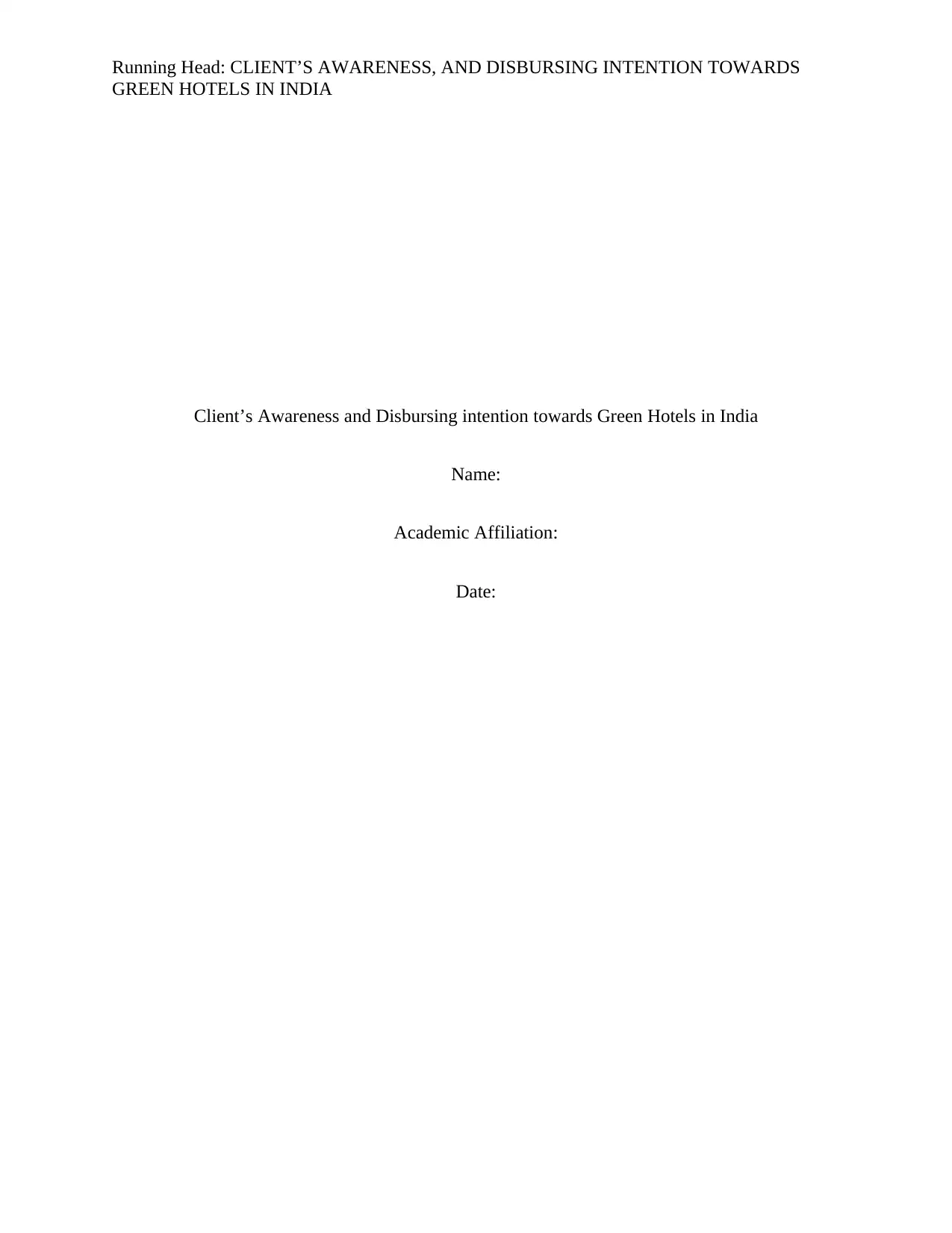
Running Head: CLIENT’S AWARENESS, AND DISBURSING INTENTION TOWARDS
GREEN HOTELS IN INDIA
Client’s Awareness and Disbursing intention towards Green Hotels in India
Name:
Academic Affiliation:
Date:
GREEN HOTELS IN INDIA
Client’s Awareness and Disbursing intention towards Green Hotels in India
Name:
Academic Affiliation:
Date:
Paraphrase This Document
Need a fresh take? Get an instant paraphrase of this document with our AI Paraphraser
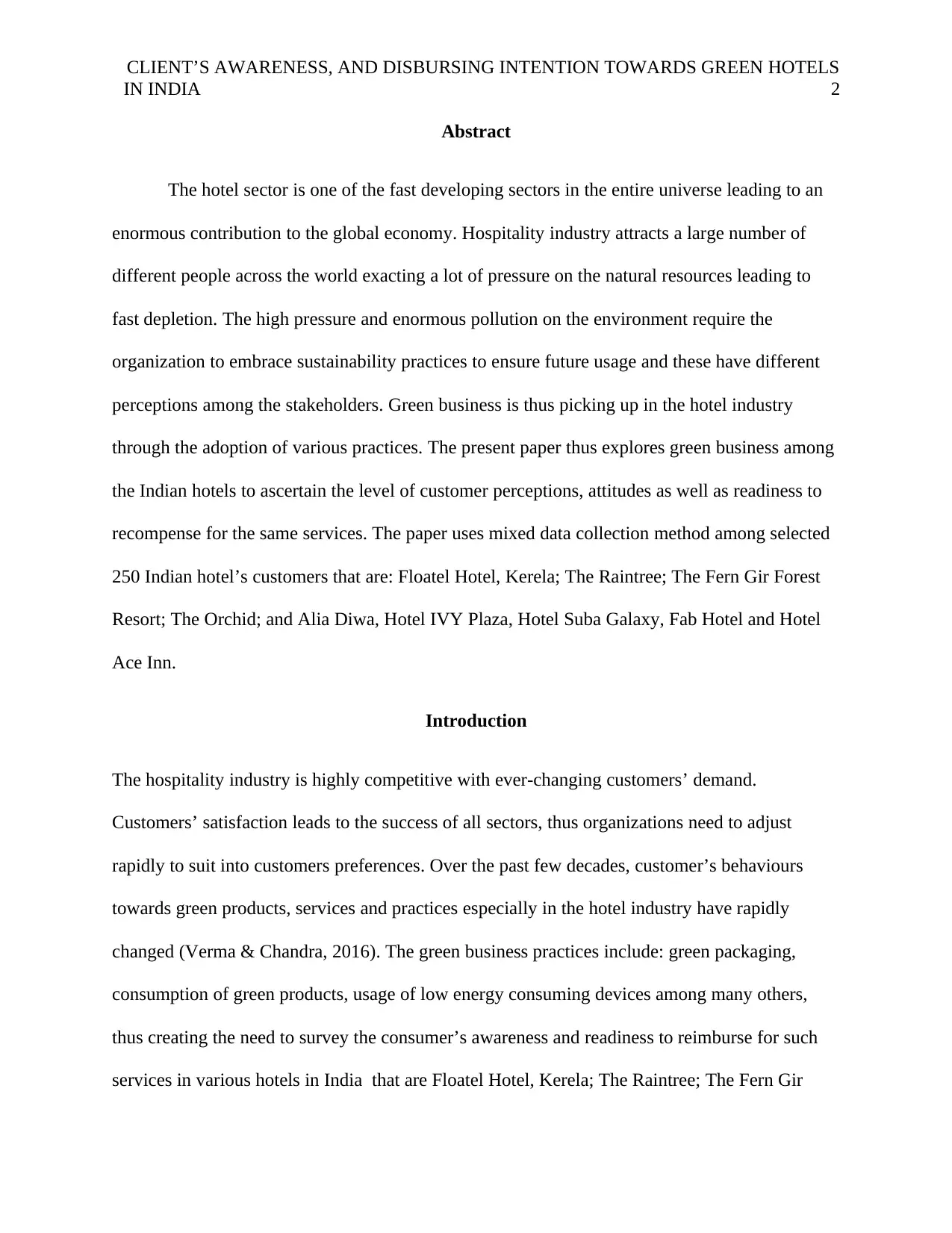
CLIENT’S AWARENESS, AND DISBURSING INTENTION TOWARDS GREEN HOTELS
IN INDIA 2
Abstract
The hotel sector is one of the fast developing sectors in the entire universe leading to an
enormous contribution to the global economy. Hospitality industry attracts a large number of
different people across the world exacting a lot of pressure on the natural resources leading to
fast depletion. The high pressure and enormous pollution on the environment require the
organization to embrace sustainability practices to ensure future usage and these have different
perceptions among the stakeholders. Green business is thus picking up in the hotel industry
through the adoption of various practices. The present paper thus explores green business among
the Indian hotels to ascertain the level of customer perceptions, attitudes as well as readiness to
recompense for the same services. The paper uses mixed data collection method among selected
250 Indian hotel’s customers that are: Floatel Hotel, Kerela; The Raintree; The Fern Gir Forest
Resort; The Orchid; and Alia Diwa, Hotel IVY Plaza, Hotel Suba Galaxy, Fab Hotel and Hotel
Ace Inn.
Introduction
The hospitality industry is highly competitive with ever-changing customers’ demand.
Customers’ satisfaction leads to the success of all sectors, thus organizations need to adjust
rapidly to suit into customers preferences. Over the past few decades, customer’s behaviours
towards green products, services and practices especially in the hotel industry have rapidly
changed (Verma & Chandra, 2016). The green business practices include: green packaging,
consumption of green products, usage of low energy consuming devices among many others,
thus creating the need to survey the consumer’s awareness and readiness to reimburse for such
services in various hotels in India that are Floatel Hotel, Kerela; The Raintree; The Fern Gir
IN INDIA 2
Abstract
The hotel sector is one of the fast developing sectors in the entire universe leading to an
enormous contribution to the global economy. Hospitality industry attracts a large number of
different people across the world exacting a lot of pressure on the natural resources leading to
fast depletion. The high pressure and enormous pollution on the environment require the
organization to embrace sustainability practices to ensure future usage and these have different
perceptions among the stakeholders. Green business is thus picking up in the hotel industry
through the adoption of various practices. The present paper thus explores green business among
the Indian hotels to ascertain the level of customer perceptions, attitudes as well as readiness to
recompense for the same services. The paper uses mixed data collection method among selected
250 Indian hotel’s customers that are: Floatel Hotel, Kerela; The Raintree; The Fern Gir Forest
Resort; The Orchid; and Alia Diwa, Hotel IVY Plaza, Hotel Suba Galaxy, Fab Hotel and Hotel
Ace Inn.
Introduction
The hospitality industry is highly competitive with ever-changing customers’ demand.
Customers’ satisfaction leads to the success of all sectors, thus organizations need to adjust
rapidly to suit into customers preferences. Over the past few decades, customer’s behaviours
towards green products, services and practices especially in the hotel industry have rapidly
changed (Verma & Chandra, 2016). The green business practices include: green packaging,
consumption of green products, usage of low energy consuming devices among many others,
thus creating the need to survey the consumer’s awareness and readiness to reimburse for such
services in various hotels in India that are Floatel Hotel, Kerela; The Raintree; The Fern Gir
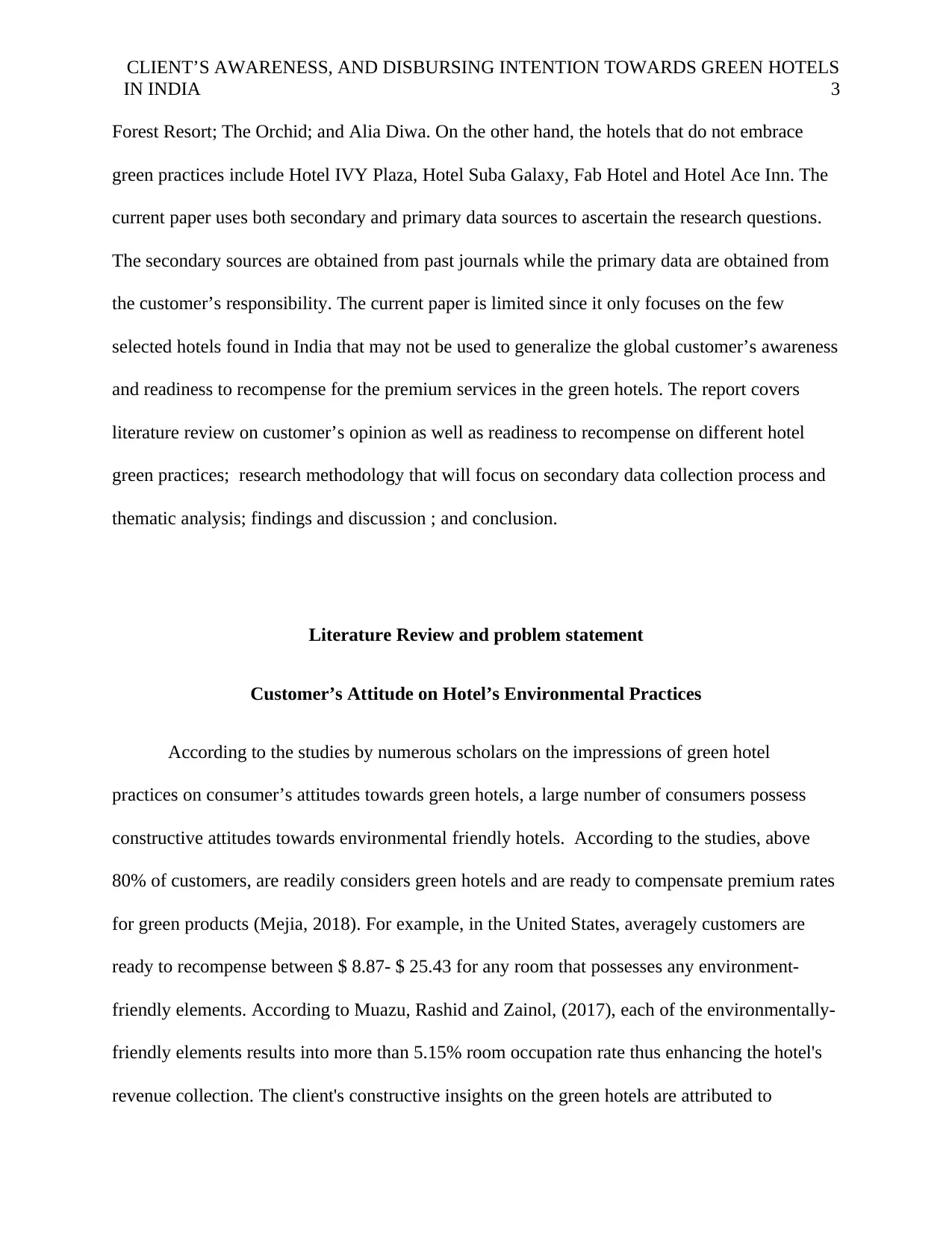
CLIENT’S AWARENESS, AND DISBURSING INTENTION TOWARDS GREEN HOTELS
IN INDIA 3
Forest Resort; The Orchid; and Alia Diwa. On the other hand, the hotels that do not embrace
green practices include Hotel IVY Plaza, Hotel Suba Galaxy, Fab Hotel and Hotel Ace Inn. The
current paper uses both secondary and primary data sources to ascertain the research questions.
The secondary sources are obtained from past journals while the primary data are obtained from
the customer’s responsibility. The current paper is limited since it only focuses on the few
selected hotels found in India that may not be used to generalize the global customer’s awareness
and readiness to recompense for the premium services in the green hotels. The report covers
literature review on customer’s opinion as well as readiness to recompense on different hotel
green practices; research methodology that will focus on secondary data collection process and
thematic analysis; findings and discussion ; and conclusion.
Literature Review and problem statement
Customer’s Attitude on Hotel’s Environmental Practices
According to the studies by numerous scholars on the impressions of green hotel
practices on consumer’s attitudes towards green hotels, a large number of consumers possess
constructive attitudes towards environmental friendly hotels. According to the studies, above
80% of customers, are readily considers green hotels and are ready to compensate premium rates
for green products (Mejia, 2018). For example, in the United States, averagely customers are
ready to recompense between $ 8.87- $ 25.43 for any room that possesses any environment-
friendly elements. According to Muazu, Rashid and Zainol, (2017), each of the environmentally-
friendly elements results into more than 5.15% room occupation rate thus enhancing the hotel's
revenue collection. The client's constructive insights on the green hotels are attributed to
IN INDIA 3
Forest Resort; The Orchid; and Alia Diwa. On the other hand, the hotels that do not embrace
green practices include Hotel IVY Plaza, Hotel Suba Galaxy, Fab Hotel and Hotel Ace Inn. The
current paper uses both secondary and primary data sources to ascertain the research questions.
The secondary sources are obtained from past journals while the primary data are obtained from
the customer’s responsibility. The current paper is limited since it only focuses on the few
selected hotels found in India that may not be used to generalize the global customer’s awareness
and readiness to recompense for the premium services in the green hotels. The report covers
literature review on customer’s opinion as well as readiness to recompense on different hotel
green practices; research methodology that will focus on secondary data collection process and
thematic analysis; findings and discussion ; and conclusion.
Literature Review and problem statement
Customer’s Attitude on Hotel’s Environmental Practices
According to the studies by numerous scholars on the impressions of green hotel
practices on consumer’s attitudes towards green hotels, a large number of consumers possess
constructive attitudes towards environmental friendly hotels. According to the studies, above
80% of customers, are readily considers green hotels and are ready to compensate premium rates
for green products (Mejia, 2018). For example, in the United States, averagely customers are
ready to recompense between $ 8.87- $ 25.43 for any room that possesses any environment-
friendly elements. According to Muazu, Rashid and Zainol, (2017), each of the environmentally-
friendly elements results into more than 5.15% room occupation rate thus enhancing the hotel's
revenue collection. The client's constructive insights on the green hotels are attributed to
⊘ This is a preview!⊘
Do you want full access?
Subscribe today to unlock all pages.

Trusted by 1+ million students worldwide
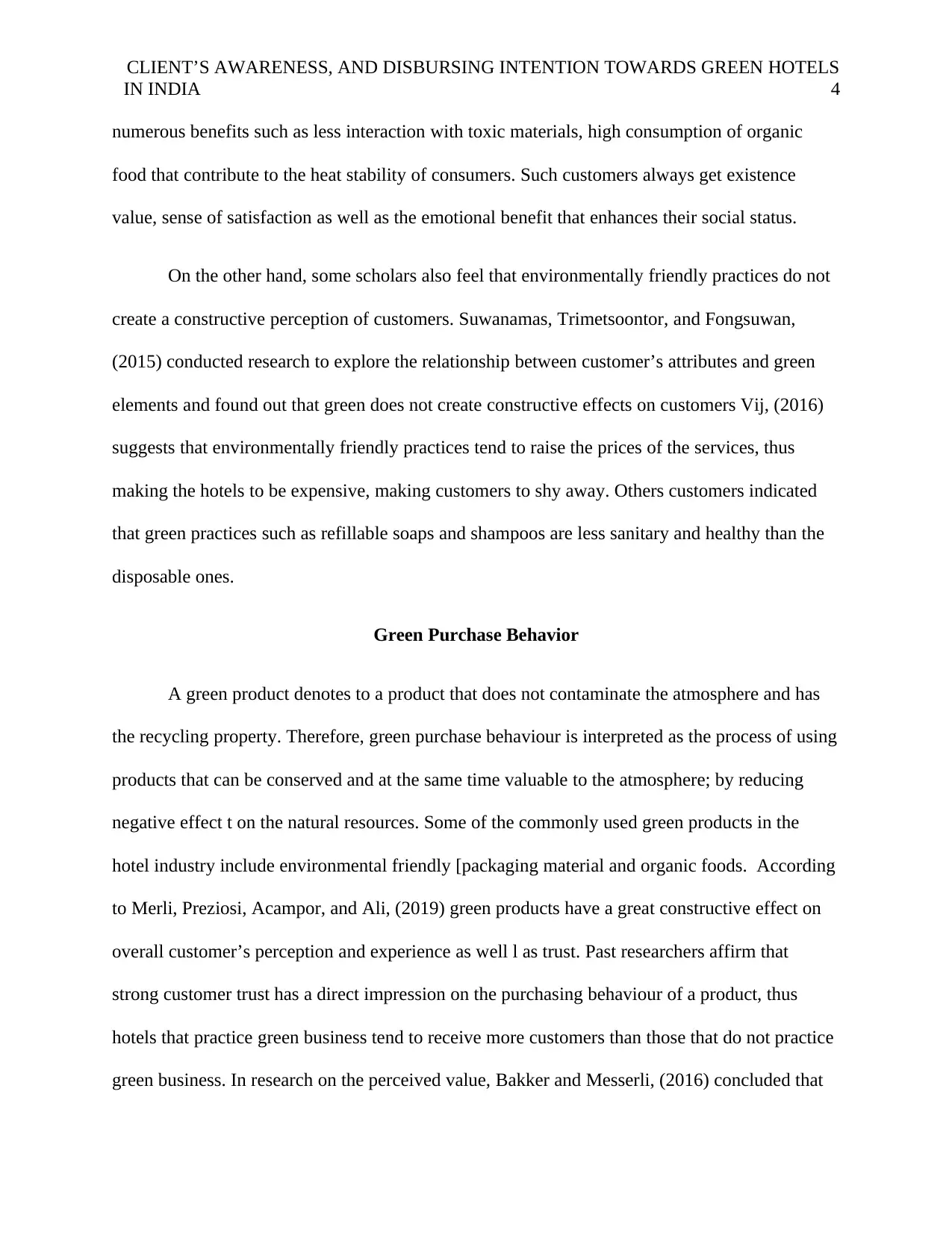
CLIENT’S AWARENESS, AND DISBURSING INTENTION TOWARDS GREEN HOTELS
IN INDIA 4
numerous benefits such as less interaction with toxic materials, high consumption of organic
food that contribute to the heat stability of consumers. Such customers always get existence
value, sense of satisfaction as well as the emotional benefit that enhances their social status.
On the other hand, some scholars also feel that environmentally friendly practices do not
create a constructive perception of customers. Suwanamas, Trimetsoontor, and Fongsuwan,
(2015) conducted research to explore the relationship between customer’s attributes and green
elements and found out that green does not create constructive effects on customers Vij, (2016)
suggests that environmentally friendly practices tend to raise the prices of the services, thus
making the hotels to be expensive, making customers to shy away. Others customers indicated
that green practices such as refillable soaps and shampoos are less sanitary and healthy than the
disposable ones.
Green Purchase Behavior
A green product denotes to a product that does not contaminate the atmosphere and has
the recycling property. Therefore, green purchase behaviour is interpreted as the process of using
products that can be conserved and at the same time valuable to the atmosphere; by reducing
negative effect t on the natural resources. Some of the commonly used green products in the
hotel industry include environmental friendly [packaging material and organic foods. According
to Merli, Preziosi, Acampor, and Ali, (2019) green products have a great constructive effect on
overall customer’s perception and experience as well l as trust. Past researchers affirm that
strong customer trust has a direct impression on the purchasing behaviour of a product, thus
hotels that practice green business tend to receive more customers than those that do not practice
green business. In research on the perceived value, Bakker and Messerli, (2016) concluded that
IN INDIA 4
numerous benefits such as less interaction with toxic materials, high consumption of organic
food that contribute to the heat stability of consumers. Such customers always get existence
value, sense of satisfaction as well as the emotional benefit that enhances their social status.
On the other hand, some scholars also feel that environmentally friendly practices do not
create a constructive perception of customers. Suwanamas, Trimetsoontor, and Fongsuwan,
(2015) conducted research to explore the relationship between customer’s attributes and green
elements and found out that green does not create constructive effects on customers Vij, (2016)
suggests that environmentally friendly practices tend to raise the prices of the services, thus
making the hotels to be expensive, making customers to shy away. Others customers indicated
that green practices such as refillable soaps and shampoos are less sanitary and healthy than the
disposable ones.
Green Purchase Behavior
A green product denotes to a product that does not contaminate the atmosphere and has
the recycling property. Therefore, green purchase behaviour is interpreted as the process of using
products that can be conserved and at the same time valuable to the atmosphere; by reducing
negative effect t on the natural resources. Some of the commonly used green products in the
hotel industry include environmental friendly [packaging material and organic foods. According
to Merli, Preziosi, Acampor, and Ali, (2019) green products have a great constructive effect on
overall customer’s perception and experience as well l as trust. Past researchers affirm that
strong customer trust has a direct impression on the purchasing behaviour of a product, thus
hotels that practice green business tend to receive more customers than those that do not practice
green business. In research on the perceived value, Bakker and Messerli, (2016) concluded that
Paraphrase This Document
Need a fresh take? Get an instant paraphrase of this document with our AI Paraphraser
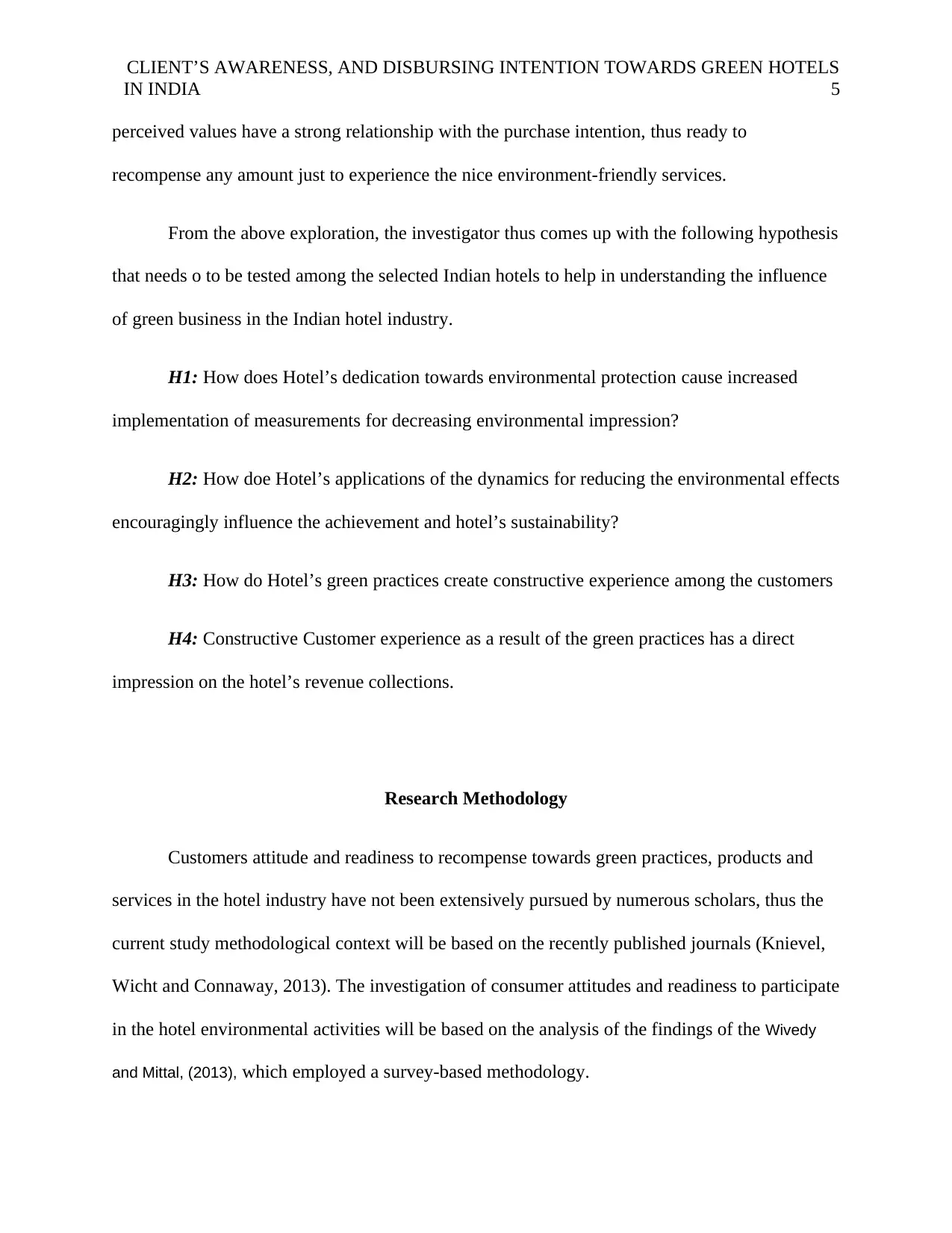
CLIENT’S AWARENESS, AND DISBURSING INTENTION TOWARDS GREEN HOTELS
IN INDIA 5
perceived values have a strong relationship with the purchase intention, thus ready to
recompense any amount just to experience the nice environment-friendly services.
From the above exploration, the investigator thus comes up with the following hypothesis
that needs o to be tested among the selected Indian hotels to help in understanding the influence
of green business in the Indian hotel industry.
H1: How does Hotel’s dedication towards environmental protection cause increased
implementation of measurements for decreasing environmental impression?
H2: How doe Hotel’s applications of the dynamics for reducing the environmental effects
encouragingly influence the achievement and hotel’s sustainability?
H3: How do Hotel’s green practices create constructive experience among the customers
H4: Constructive Customer experience as a result of the green practices has a direct
impression on the hotel’s revenue collections.
Research Methodology
Customers attitude and readiness to recompense towards green practices, products and
services in the hotel industry have not been extensively pursued by numerous scholars, thus the
current study methodological context will be based on the recently published journals (Knievel,
Wicht and Connaway, 2013). The investigation of consumer attitudes and readiness to participate
in the hotel environmental activities will be based on the analysis of the findings of the Wivedy
and Mittal, (2013), which employed a survey-based methodology.
IN INDIA 5
perceived values have a strong relationship with the purchase intention, thus ready to
recompense any amount just to experience the nice environment-friendly services.
From the above exploration, the investigator thus comes up with the following hypothesis
that needs o to be tested among the selected Indian hotels to help in understanding the influence
of green business in the Indian hotel industry.
H1: How does Hotel’s dedication towards environmental protection cause increased
implementation of measurements for decreasing environmental impression?
H2: How doe Hotel’s applications of the dynamics for reducing the environmental effects
encouragingly influence the achievement and hotel’s sustainability?
H3: How do Hotel’s green practices create constructive experience among the customers
H4: Constructive Customer experience as a result of the green practices has a direct
impression on the hotel’s revenue collections.
Research Methodology
Customers attitude and readiness to recompense towards green practices, products and
services in the hotel industry have not been extensively pursued by numerous scholars, thus the
current study methodological context will be based on the recently published journals (Knievel,
Wicht and Connaway, 2013). The investigation of consumer attitudes and readiness to participate
in the hotel environmental activities will be based on the analysis of the findings of the Wivedy
and Mittal, (2013), which employed a survey-based methodology.
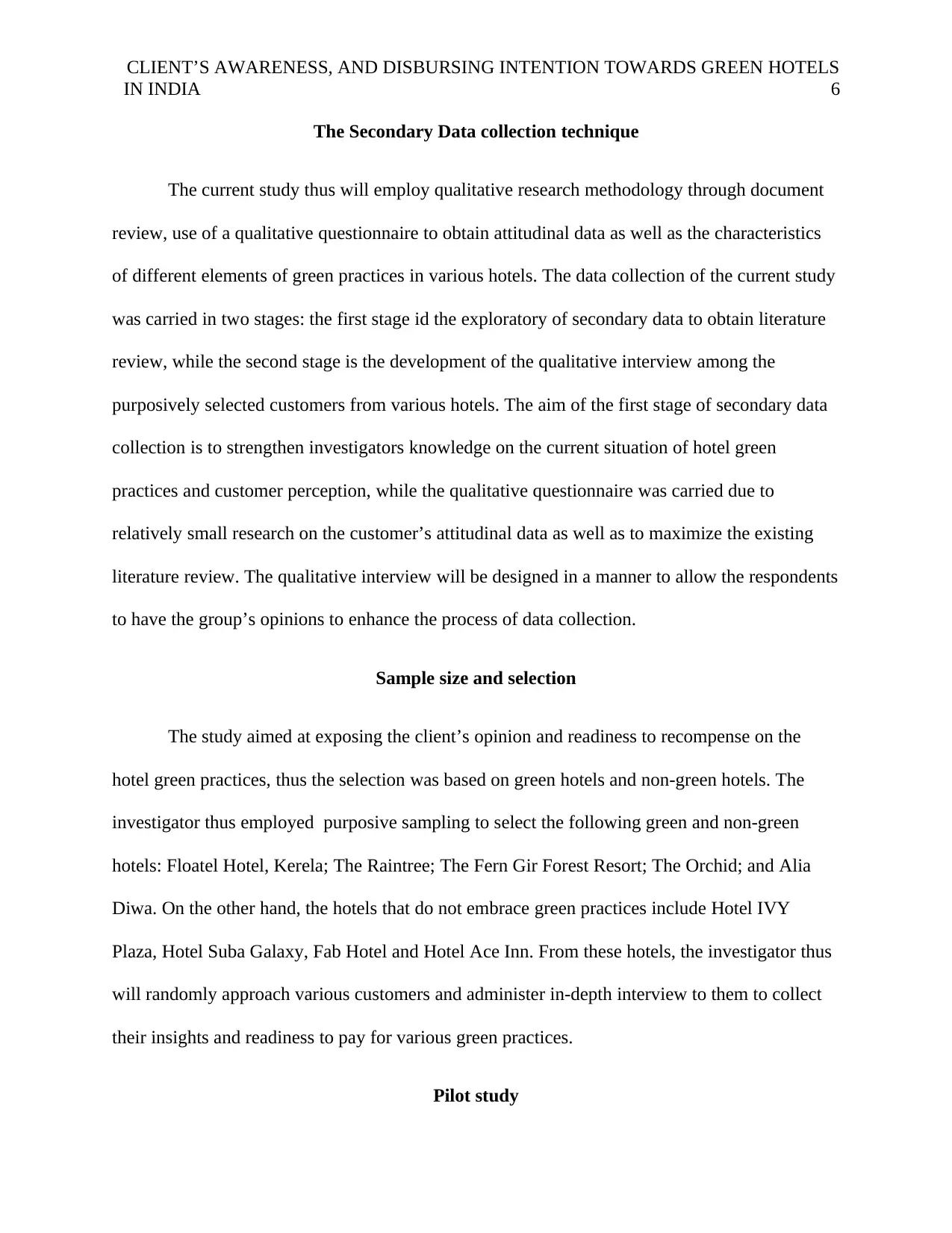
CLIENT’S AWARENESS, AND DISBURSING INTENTION TOWARDS GREEN HOTELS
IN INDIA 6
The Secondary Data collection technique
The current study thus will employ qualitative research methodology through document
review, use of a qualitative questionnaire to obtain attitudinal data as well as the characteristics
of different elements of green practices in various hotels. The data collection of the current study
was carried in two stages: the first stage id the exploratory of secondary data to obtain literature
review, while the second stage is the development of the qualitative interview among the
purposively selected customers from various hotels. The aim of the first stage of secondary data
collection is to strengthen investigators knowledge on the current situation of hotel green
practices and customer perception, while the qualitative questionnaire was carried due to
relatively small research on the customer’s attitudinal data as well as to maximize the existing
literature review. The qualitative interview will be designed in a manner to allow the respondents
to have the group’s opinions to enhance the process of data collection.
Sample size and selection
The study aimed at exposing the client’s opinion and readiness to recompense on the
hotel green practices, thus the selection was based on green hotels and non-green hotels. The
investigator thus employed purposive sampling to select the following green and non-green
hotels: Floatel Hotel, Kerela; The Raintree; The Fern Gir Forest Resort; The Orchid; and Alia
Diwa. On the other hand, the hotels that do not embrace green practices include Hotel IVY
Plaza, Hotel Suba Galaxy, Fab Hotel and Hotel Ace Inn. From these hotels, the investigator thus
will randomly approach various customers and administer in-depth interview to them to collect
their insights and readiness to pay for various green practices.
Pilot study
IN INDIA 6
The Secondary Data collection technique
The current study thus will employ qualitative research methodology through document
review, use of a qualitative questionnaire to obtain attitudinal data as well as the characteristics
of different elements of green practices in various hotels. The data collection of the current study
was carried in two stages: the first stage id the exploratory of secondary data to obtain literature
review, while the second stage is the development of the qualitative interview among the
purposively selected customers from various hotels. The aim of the first stage of secondary data
collection is to strengthen investigators knowledge on the current situation of hotel green
practices and customer perception, while the qualitative questionnaire was carried due to
relatively small research on the customer’s attitudinal data as well as to maximize the existing
literature review. The qualitative interview will be designed in a manner to allow the respondents
to have the group’s opinions to enhance the process of data collection.
Sample size and selection
The study aimed at exposing the client’s opinion and readiness to recompense on the
hotel green practices, thus the selection was based on green hotels and non-green hotels. The
investigator thus employed purposive sampling to select the following green and non-green
hotels: Floatel Hotel, Kerela; The Raintree; The Fern Gir Forest Resort; The Orchid; and Alia
Diwa. On the other hand, the hotels that do not embrace green practices include Hotel IVY
Plaza, Hotel Suba Galaxy, Fab Hotel and Hotel Ace Inn. From these hotels, the investigator thus
will randomly approach various customers and administer in-depth interview to them to collect
their insights and readiness to pay for various green practices.
Pilot study
⊘ This is a preview!⊘
Do you want full access?
Subscribe today to unlock all pages.

Trusted by 1+ million students worldwide
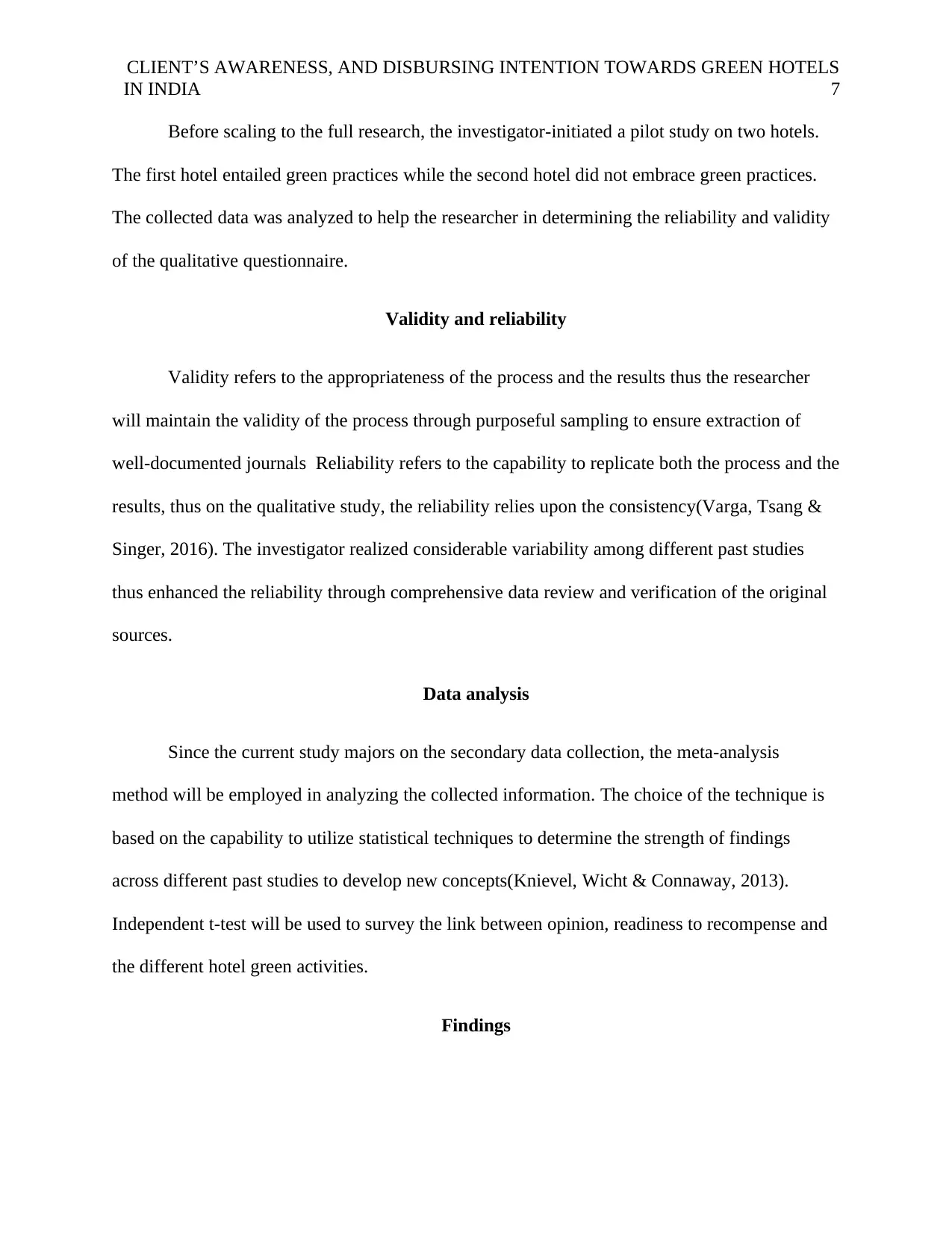
CLIENT’S AWARENESS, AND DISBURSING INTENTION TOWARDS GREEN HOTELS
IN INDIA 7
Before scaling to the full research, the investigator-initiated a pilot study on two hotels.
The first hotel entailed green practices while the second hotel did not embrace green practices.
The collected data was analyzed to help the researcher in determining the reliability and validity
of the qualitative questionnaire.
Validity and reliability
Validity refers to the appropriateness of the process and the results thus the researcher
will maintain the validity of the process through purposeful sampling to ensure extraction of
well-documented journals Reliability refers to the capability to replicate both the process and the
results, thus on the qualitative study, the reliability relies upon the consistency(Varga, Tsang &
Singer, 2016). The investigator realized considerable variability among different past studies
thus enhanced the reliability through comprehensive data review and verification of the original
sources.
Data analysis
Since the current study majors on the secondary data collection, the meta-analysis
method will be employed in analyzing the collected information. The choice of the technique is
based on the capability to utilize statistical techniques to determine the strength of findings
across different past studies to develop new concepts(Knievel, Wicht & Connaway, 2013).
Independent t-test will be used to survey the link between opinion, readiness to recompense and
the different hotel green activities.
Findings
IN INDIA 7
Before scaling to the full research, the investigator-initiated a pilot study on two hotels.
The first hotel entailed green practices while the second hotel did not embrace green practices.
The collected data was analyzed to help the researcher in determining the reliability and validity
of the qualitative questionnaire.
Validity and reliability
Validity refers to the appropriateness of the process and the results thus the researcher
will maintain the validity of the process through purposeful sampling to ensure extraction of
well-documented journals Reliability refers to the capability to replicate both the process and the
results, thus on the qualitative study, the reliability relies upon the consistency(Varga, Tsang &
Singer, 2016). The investigator realized considerable variability among different past studies
thus enhanced the reliability through comprehensive data review and verification of the original
sources.
Data analysis
Since the current study majors on the secondary data collection, the meta-analysis
method will be employed in analyzing the collected information. The choice of the technique is
based on the capability to utilize statistical techniques to determine the strength of findings
across different past studies to develop new concepts(Knievel, Wicht & Connaway, 2013).
Independent t-test will be used to survey the link between opinion, readiness to recompense and
the different hotel green activities.
Findings
Paraphrase This Document
Need a fresh take? Get an instant paraphrase of this document with our AI Paraphraser
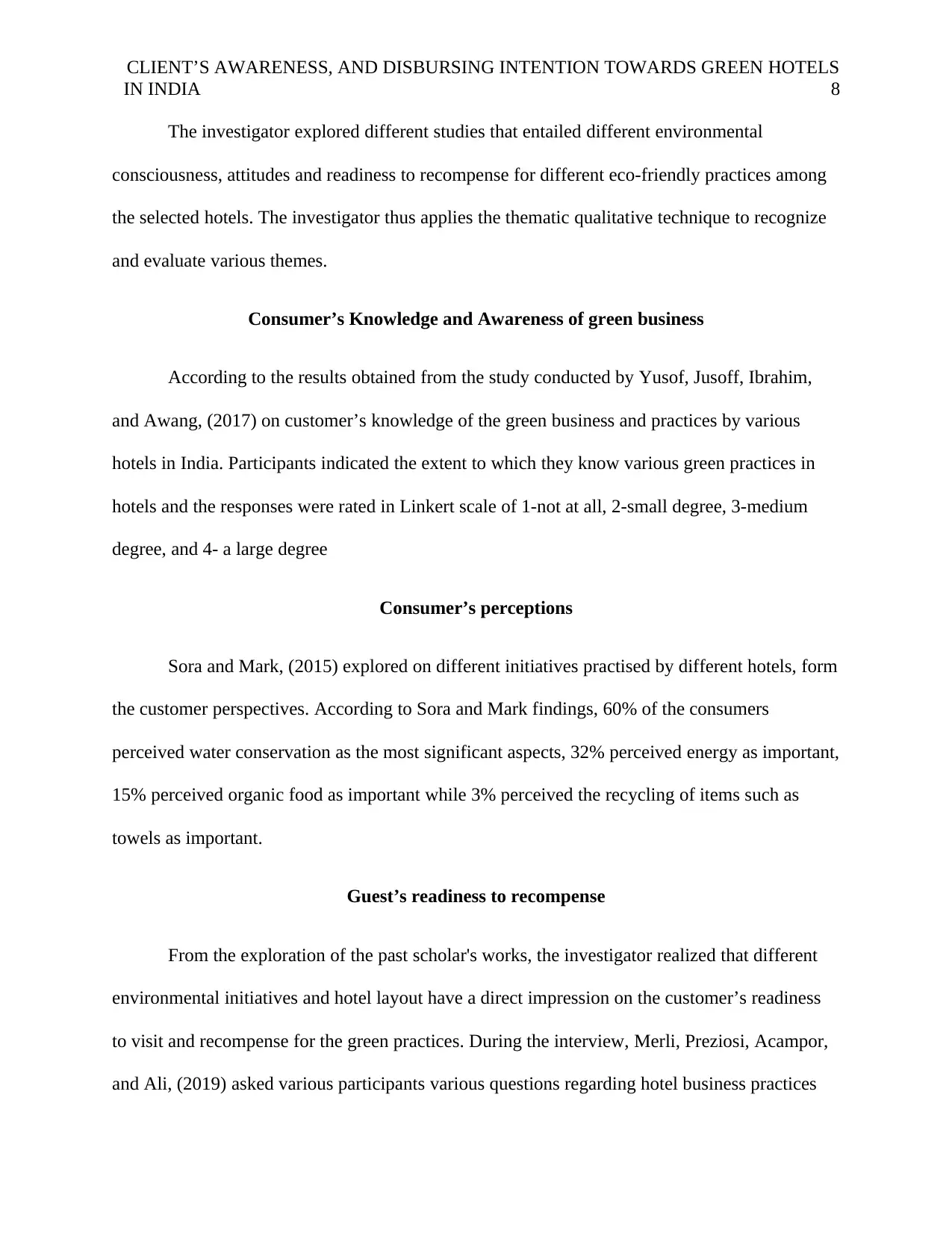
CLIENT’S AWARENESS, AND DISBURSING INTENTION TOWARDS GREEN HOTELS
IN INDIA 8
The investigator explored different studies that entailed different environmental
consciousness, attitudes and readiness to recompense for different eco-friendly practices among
the selected hotels. The investigator thus applies the thematic qualitative technique to recognize
and evaluate various themes.
Consumer’s Knowledge and Awareness of green business
According to the results obtained from the study conducted by Yusof, Jusoff, Ibrahim,
and Awang, (2017) on customer’s knowledge of the green business and practices by various
hotels in India. Participants indicated the extent to which they know various green practices in
hotels and the responses were rated in Linkert scale of 1-not at all, 2-small degree, 3-medium
degree, and 4- a large degree
Consumer’s perceptions
Sora and Mark, (2015) explored on different initiatives practised by different hotels, form
the customer perspectives. According to Sora and Mark findings, 60% of the consumers
perceived water conservation as the most significant aspects, 32% perceived energy as important,
15% perceived organic food as important while 3% perceived the recycling of items such as
towels as important.
Guest’s readiness to recompense
From the exploration of the past scholar's works, the investigator realized that different
environmental initiatives and hotel layout have a direct impression on the customer’s readiness
to visit and recompense for the green practices. During the interview, Merli, Preziosi, Acampor,
and Ali, (2019) asked various participants various questions regarding hotel business practices
IN INDIA 8
The investigator explored different studies that entailed different environmental
consciousness, attitudes and readiness to recompense for different eco-friendly practices among
the selected hotels. The investigator thus applies the thematic qualitative technique to recognize
and evaluate various themes.
Consumer’s Knowledge and Awareness of green business
According to the results obtained from the study conducted by Yusof, Jusoff, Ibrahim,
and Awang, (2017) on customer’s knowledge of the green business and practices by various
hotels in India. Participants indicated the extent to which they know various green practices in
hotels and the responses were rated in Linkert scale of 1-not at all, 2-small degree, 3-medium
degree, and 4- a large degree
Consumer’s perceptions
Sora and Mark, (2015) explored on different initiatives practised by different hotels, form
the customer perspectives. According to Sora and Mark findings, 60% of the consumers
perceived water conservation as the most significant aspects, 32% perceived energy as important,
15% perceived organic food as important while 3% perceived the recycling of items such as
towels as important.
Guest’s readiness to recompense
From the exploration of the past scholar's works, the investigator realized that different
environmental initiatives and hotel layout have a direct impression on the customer’s readiness
to visit and recompense for the green practices. During the interview, Merli, Preziosi, Acampor,
and Ali, (2019) asked various participants various questions regarding hotel business practices
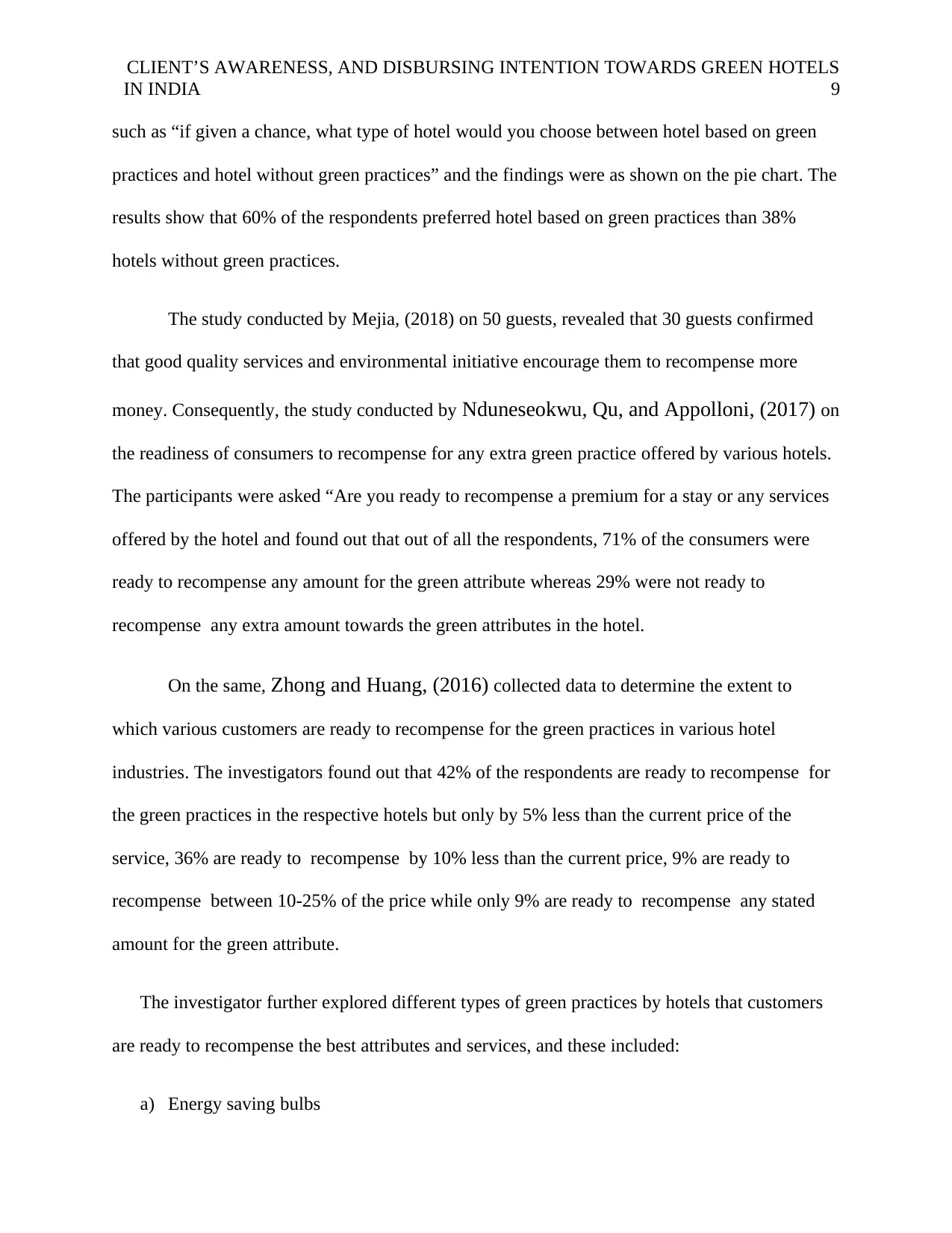
CLIENT’S AWARENESS, AND DISBURSING INTENTION TOWARDS GREEN HOTELS
IN INDIA 9
such as “if given a chance, what type of hotel would you choose between hotel based on green
practices and hotel without green practices” and the findings were as shown on the pie chart. The
results show that 60% of the respondents preferred hotel based on green practices than 38%
hotels without green practices.
The study conducted by Mejia, (2018) on 50 guests, revealed that 30 guests confirmed
that good quality services and environmental initiative encourage them to recompense more
money. Consequently, the study conducted by Nduneseokwu, Qu, and Appolloni, (2017) on
the readiness of consumers to recompense for any extra green practice offered by various hotels.
The participants were asked “Are you ready to recompense a premium for a stay or any services
offered by the hotel and found out that out of all the respondents, 71% of the consumers were
ready to recompense any amount for the green attribute whereas 29% were not ready to
recompense any extra amount towards the green attributes in the hotel.
On the same, Zhong and Huang, (2016) collected data to determine the extent to
which various customers are ready to recompense for the green practices in various hotel
industries. The investigators found out that 42% of the respondents are ready to recompense for
the green practices in the respective hotels but only by 5% less than the current price of the
service, 36% are ready to recompense by 10% less than the current price, 9% are ready to
recompense between 10-25% of the price while only 9% are ready to recompense any stated
amount for the green attribute.
The investigator further explored different types of green practices by hotels that customers
are ready to recompense the best attributes and services, and these included:
a) Energy saving bulbs
IN INDIA 9
such as “if given a chance, what type of hotel would you choose between hotel based on green
practices and hotel without green practices” and the findings were as shown on the pie chart. The
results show that 60% of the respondents preferred hotel based on green practices than 38%
hotels without green practices.
The study conducted by Mejia, (2018) on 50 guests, revealed that 30 guests confirmed
that good quality services and environmental initiative encourage them to recompense more
money. Consequently, the study conducted by Nduneseokwu, Qu, and Appolloni, (2017) on
the readiness of consumers to recompense for any extra green practice offered by various hotels.
The participants were asked “Are you ready to recompense a premium for a stay or any services
offered by the hotel and found out that out of all the respondents, 71% of the consumers were
ready to recompense any amount for the green attribute whereas 29% were not ready to
recompense any extra amount towards the green attributes in the hotel.
On the same, Zhong and Huang, (2016) collected data to determine the extent to
which various customers are ready to recompense for the green practices in various hotel
industries. The investigators found out that 42% of the respondents are ready to recompense for
the green practices in the respective hotels but only by 5% less than the current price of the
service, 36% are ready to recompense by 10% less than the current price, 9% are ready to
recompense between 10-25% of the price while only 9% are ready to recompense any stated
amount for the green attribute.
The investigator further explored different types of green practices by hotels that customers
are ready to recompense the best attributes and services, and these included:
a) Energy saving bulbs
⊘ This is a preview!⊘
Do you want full access?
Subscribe today to unlock all pages.

Trusted by 1+ million students worldwide
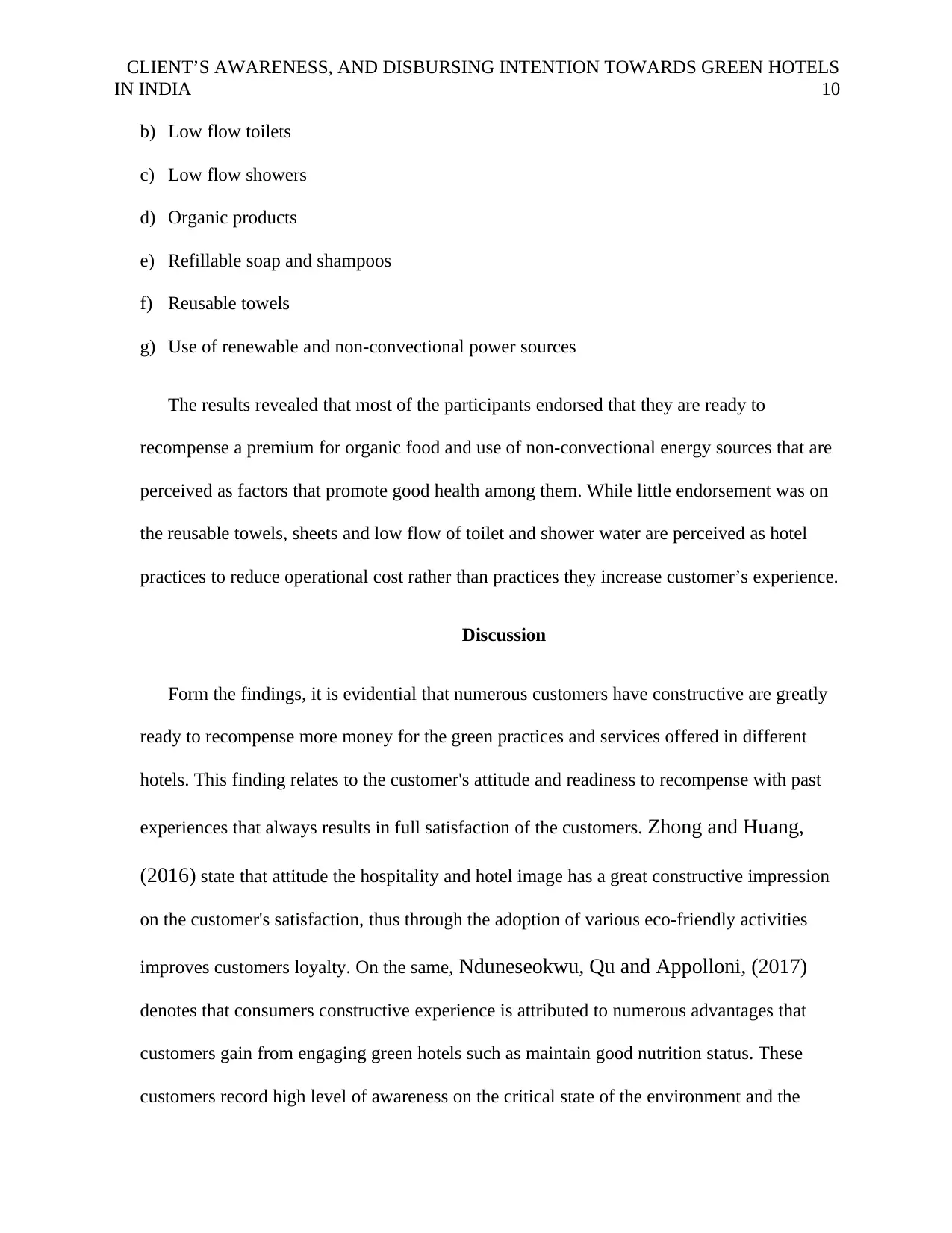
CLIENT’S AWARENESS, AND DISBURSING INTENTION TOWARDS GREEN HOTELS
IN INDIA 10
b) Low flow toilets
c) Low flow showers
d) Organic products
e) Refillable soap and shampoos
f) Reusable towels
g) Use of renewable and non-convectional power sources
The results revealed that most of the participants endorsed that they are ready to
recompense a premium for organic food and use of non-convectional energy sources that are
perceived as factors that promote good health among them. While little endorsement was on
the reusable towels, sheets and low flow of toilet and shower water are perceived as hotel
practices to reduce operational cost rather than practices they increase customer’s experience.
Discussion
Form the findings, it is evidential that numerous customers have constructive are greatly
ready to recompense more money for the green practices and services offered in different
hotels. This finding relates to the customer's attitude and readiness to recompense with past
experiences that always results in full satisfaction of the customers. Zhong and Huang,
(2016) state that attitude the hospitality and hotel image has a great constructive impression
on the customer's satisfaction, thus through the adoption of various eco-friendly activities
improves customers loyalty. On the same, Nduneseokwu, Qu and Appolloni, (2017)
denotes that consumers constructive experience is attributed to numerous advantages that
customers gain from engaging green hotels such as maintain good nutrition status. These
customers record high level of awareness on the critical state of the environment and the
IN INDIA 10
b) Low flow toilets
c) Low flow showers
d) Organic products
e) Refillable soap and shampoos
f) Reusable towels
g) Use of renewable and non-convectional power sources
The results revealed that most of the participants endorsed that they are ready to
recompense a premium for organic food and use of non-convectional energy sources that are
perceived as factors that promote good health among them. While little endorsement was on
the reusable towels, sheets and low flow of toilet and shower water are perceived as hotel
practices to reduce operational cost rather than practices they increase customer’s experience.
Discussion
Form the findings, it is evidential that numerous customers have constructive are greatly
ready to recompense more money for the green practices and services offered in different
hotels. This finding relates to the customer's attitude and readiness to recompense with past
experiences that always results in full satisfaction of the customers. Zhong and Huang,
(2016) state that attitude the hospitality and hotel image has a great constructive impression
on the customer's satisfaction, thus through the adoption of various eco-friendly activities
improves customers loyalty. On the same, Nduneseokwu, Qu and Appolloni, (2017)
denotes that consumers constructive experience is attributed to numerous advantages that
customers gain from engaging green hotels such as maintain good nutrition status. These
customers record high level of awareness on the critical state of the environment and the
Paraphrase This Document
Need a fresh take? Get an instant paraphrase of this document with our AI Paraphraser
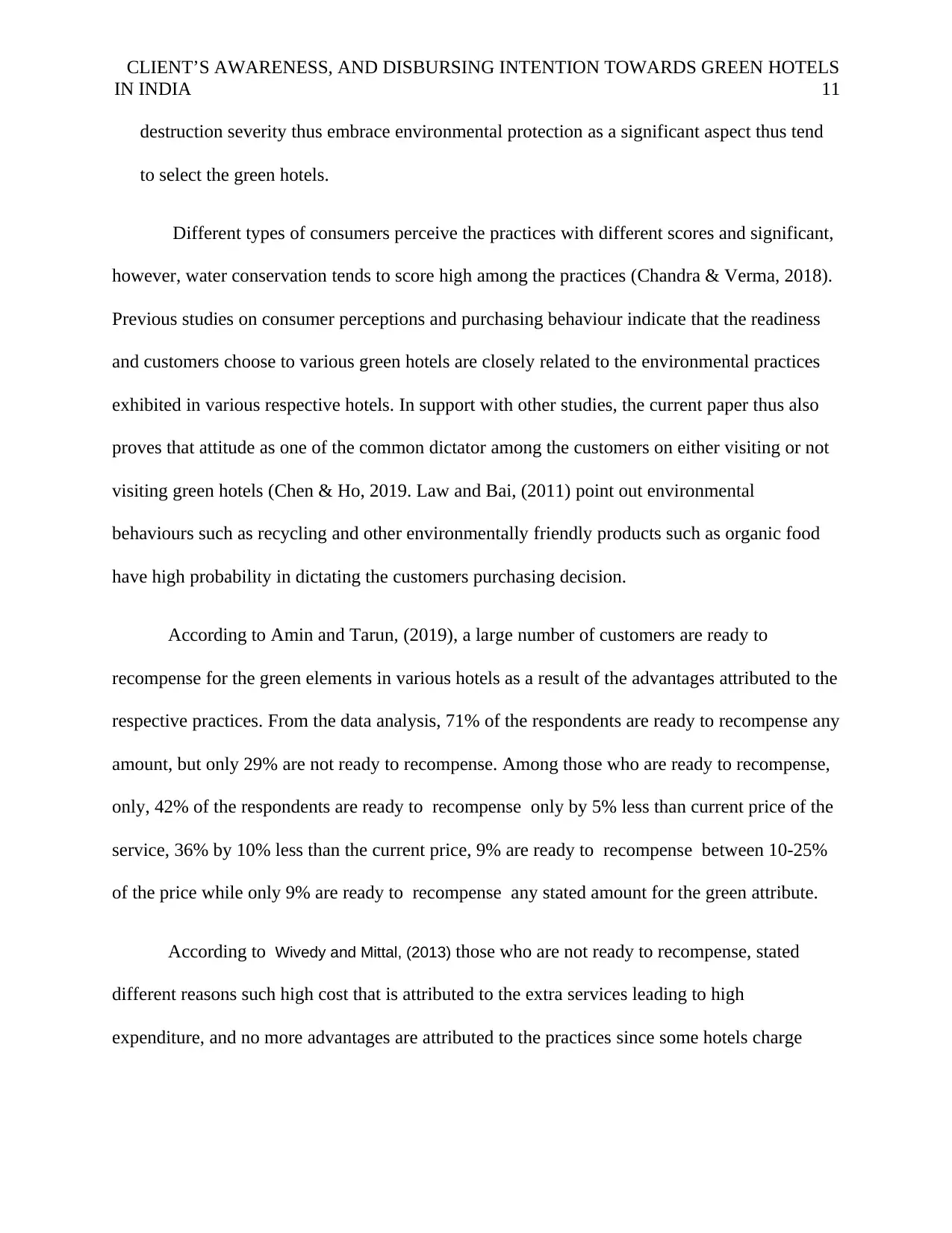
CLIENT’S AWARENESS, AND DISBURSING INTENTION TOWARDS GREEN HOTELS
IN INDIA 11
destruction severity thus embrace environmental protection as a significant aspect thus tend
to select the green hotels.
Different types of consumers perceive the practices with different scores and significant,
however, water conservation tends to score high among the practices (Chandra & Verma, 2018).
Previous studies on consumer perceptions and purchasing behaviour indicate that the readiness
and customers choose to various green hotels are closely related to the environmental practices
exhibited in various respective hotels. In support with other studies, the current paper thus also
proves that attitude as one of the common dictator among the customers on either visiting or not
visiting green hotels (Chen & Ho, 2019. Law and Bai, (2011) point out environmental
behaviours such as recycling and other environmentally friendly products such as organic food
have high probability in dictating the customers purchasing decision.
According to Amin and Tarun, (2019), a large number of customers are ready to
recompense for the green elements in various hotels as a result of the advantages attributed to the
respective practices. From the data analysis, 71% of the respondents are ready to recompense any
amount, but only 29% are not ready to recompense. Among those who are ready to recompense,
only, 42% of the respondents are ready to recompense only by 5% less than current price of the
service, 36% by 10% less than the current price, 9% are ready to recompense between 10-25%
of the price while only 9% are ready to recompense any stated amount for the green attribute.
According to Wivedy and Mittal, (2013) those who are not ready to recompense, stated
different reasons such high cost that is attributed to the extra services leading to high
expenditure, and no more advantages are attributed to the practices since some hotels charge
IN INDIA 11
destruction severity thus embrace environmental protection as a significant aspect thus tend
to select the green hotels.
Different types of consumers perceive the practices with different scores and significant,
however, water conservation tends to score high among the practices (Chandra & Verma, 2018).
Previous studies on consumer perceptions and purchasing behaviour indicate that the readiness
and customers choose to various green hotels are closely related to the environmental practices
exhibited in various respective hotels. In support with other studies, the current paper thus also
proves that attitude as one of the common dictator among the customers on either visiting or not
visiting green hotels (Chen & Ho, 2019. Law and Bai, (2011) point out environmental
behaviours such as recycling and other environmentally friendly products such as organic food
have high probability in dictating the customers purchasing decision.
According to Amin and Tarun, (2019), a large number of customers are ready to
recompense for the green elements in various hotels as a result of the advantages attributed to the
respective practices. From the data analysis, 71% of the respondents are ready to recompense any
amount, but only 29% are not ready to recompense. Among those who are ready to recompense,
only, 42% of the respondents are ready to recompense only by 5% less than current price of the
service, 36% by 10% less than the current price, 9% are ready to recompense between 10-25%
of the price while only 9% are ready to recompense any stated amount for the green attribute.
According to Wivedy and Mittal, (2013) those who are not ready to recompense, stated
different reasons such high cost that is attributed to the extra services leading to high
expenditure, and no more advantages are attributed to the practices since some hotels charge
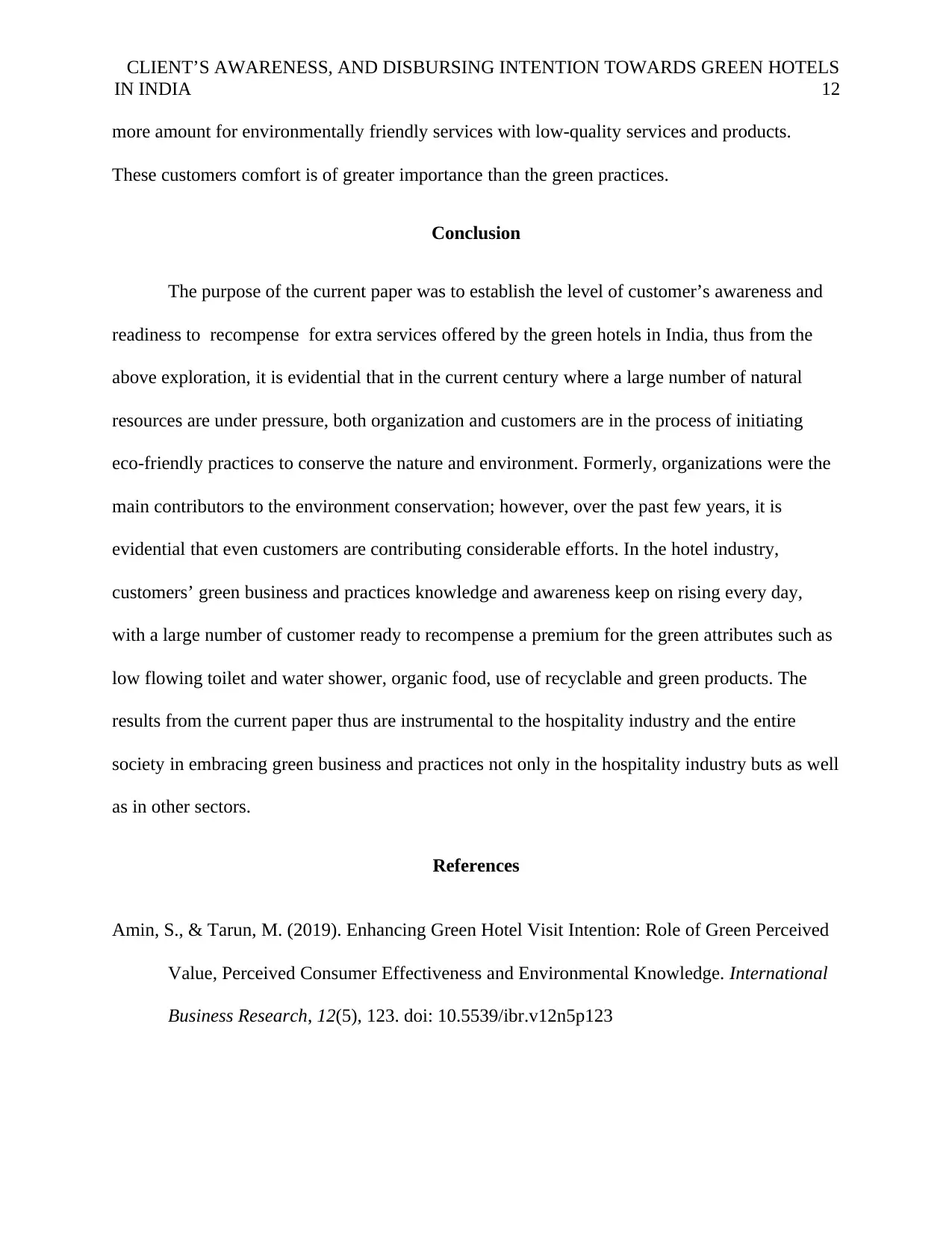
CLIENT’S AWARENESS, AND DISBURSING INTENTION TOWARDS GREEN HOTELS
IN INDIA 12
more amount for environmentally friendly services with low-quality services and products.
These customers comfort is of greater importance than the green practices.
Conclusion
The purpose of the current paper was to establish the level of customer’s awareness and
readiness to recompense for extra services offered by the green hotels in India, thus from the
above exploration, it is evidential that in the current century where a large number of natural
resources are under pressure, both organization and customers are in the process of initiating
eco-friendly practices to conserve the nature and environment. Formerly, organizations were the
main contributors to the environment conservation; however, over the past few years, it is
evidential that even customers are contributing considerable efforts. In the hotel industry,
customers’ green business and practices knowledge and awareness keep on rising every day,
with a large number of customer ready to recompense a premium for the green attributes such as
low flowing toilet and water shower, organic food, use of recyclable and green products. The
results from the current paper thus are instrumental to the hospitality industry and the entire
society in embracing green business and practices not only in the hospitality industry buts as well
as in other sectors.
References
Amin, S., & Tarun, M. (2019). Enhancing Green Hotel Visit Intention: Role of Green Perceived
Value, Perceived Consumer Effectiveness and Environmental Knowledge. International
Business Research, 12(5), 123. doi: 10.5539/ibr.v12n5p123
IN INDIA 12
more amount for environmentally friendly services with low-quality services and products.
These customers comfort is of greater importance than the green practices.
Conclusion
The purpose of the current paper was to establish the level of customer’s awareness and
readiness to recompense for extra services offered by the green hotels in India, thus from the
above exploration, it is evidential that in the current century where a large number of natural
resources are under pressure, both organization and customers are in the process of initiating
eco-friendly practices to conserve the nature and environment. Formerly, organizations were the
main contributors to the environment conservation; however, over the past few years, it is
evidential that even customers are contributing considerable efforts. In the hotel industry,
customers’ green business and practices knowledge and awareness keep on rising every day,
with a large number of customer ready to recompense a premium for the green attributes such as
low flowing toilet and water shower, organic food, use of recyclable and green products. The
results from the current paper thus are instrumental to the hospitality industry and the entire
society in embracing green business and practices not only in the hospitality industry buts as well
as in other sectors.
References
Amin, S., & Tarun, M. (2019). Enhancing Green Hotel Visit Intention: Role of Green Perceived
Value, Perceived Consumer Effectiveness and Environmental Knowledge. International
Business Research, 12(5), 123. doi: 10.5539/ibr.v12n5p123
⊘ This is a preview!⊘
Do you want full access?
Subscribe today to unlock all pages.

Trusted by 1+ million students worldwide
1 out of 16
Your All-in-One AI-Powered Toolkit for Academic Success.
+13062052269
info@desklib.com
Available 24*7 on WhatsApp / Email
![[object Object]](/_next/static/media/star-bottom.7253800d.svg)
Unlock your academic potential
Copyright © 2020–2026 A2Z Services. All Rights Reserved. Developed and managed by ZUCOL.